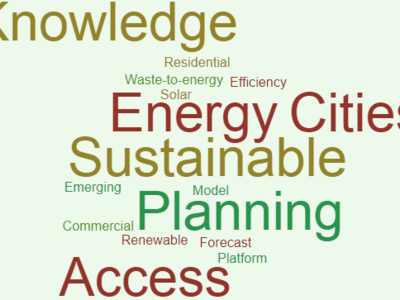

Tuesday, 19th of November 2019, 6 p.m.
OeAD, Ebendorferstraße 7, 1010 Vienna
Sustainability in practice requires scaling down the focus from national to local level, where a key component of public action is the proximity with communities. This proximity supports an efficient intervention in building climate resilient-cities in the framework of a global action to combat climate change. Energy systems are major contributors to pollutants that cause climate variability. In its 2018 report, the United Nations’ Intergovernmental Panel on Climate Change (IPCC) estimates that limiting global warming to 1.5°C will require to bump the share of renewables in the electricity supply mix to 97% by 2050.
The project Sustainable energy Access for Sustainable Cities | SEA4cities aims at supporting research on the potential of emerging cities to access and transition to energy sustainability. Within this framework the Energy System Planning Software (ESPM) was developed. The software brings the contribution of information technology to the renewables’ bump in emerging cities, as a readily accessible tool that supports citizens (incl. non-energy specialists) in planning and monitoring tailored energy solutions. Apart from climate variability, sustainable energy solutions correlate with life standards in both urban and rural environments, and broadly impact the potential to achieve the other sustainable developments goals, including SDG 8 (economic growth), SDG 11 (sustainable cities), and SDG 12 (sustainable production and consumption).
In this APPEAR in practice, the SEA4cities team will present achievements and lessons learned from SEA4cities implementation since its inception in January 2018, together with guest speakers who will set the context of energy sustainability in cities. Martin Lugmayr (United Nations Industrial Development Organization - UNIDO) will introduce the topic of energy sustainability in relation with SDGs 7 and 11. Mamadou Wade (SEA4cities) will briefly present the energy challenges that currently Dakar faces, and those that may arise from Senegal upcoming status as oil and gas producer by 2021. Michael Rohrer (Austrian Energy Agency - AEA) will present the AEA experience on implementing sustainable energy projects in Sub-Saharan Africa, including achievements and lessons learned. Aminata Fall (SEA4cities) will conclude with a live demo of the ESPM software that features true-to-life energy scenarios in different city contexts.
Welcome remarks: Matthias Themel (Austrian Development Agency)
Presentations and panel discussion followed by socializing over drinks and food.
Speakers (in alphabetical order):
Aminata Fall is research associate and PhD candidate in the TU Vienna Energy Economics Group. Before joining the TU, she was Sustainable Energy expert at UNIDO Vienna, working on implementation of projects in Cape Verde, DR Congo, Mozambique, and Senegal. Prior to this assignment, she worked at the ECOWAS Centre for Renewable Energy and Energy Efficiency in Cape Verde. Aminata Fall is coordinator of SEA4cities at TU Vienna.
Martin Lugmayr is coordinator of the Global Network of Regional Sustainable Energy Centres Program that has been created by the United Nations Industrial Development Organization (UNIDO), in cooperation with the Austrian Development Agency (ADA). Before joining UNIDO, he worked on international energy policy at the Austrian Ministry for Foreign Affairs and for the Global Forum on Sustainable Energy.
Michael Rohrer is expert in energy economics and technology in the Austrian Energy Agency Partnership project with Central and Eastern Europe countries. Before joining the Austrian Energy Agency, Mr. Rohrer worked in Sierra Leone on implementation of a rural electrification project with the United Nations Office for Project Services (UNOPS). Prior to this assignment, he worked on mini-grid projects in several African countries, with a specialization on project development and policy regulation.
Mamadou Wade is senior lecturer on mechanics of energy systems, and head of the Department for Academic Affairs of Ecole Polytechnique Thies (EPT), Senegal. He coordinates for EPT the University Programme on Renewable Energies and Energy Efficiency in Senegal (PESEREE) jointly implemented by four universities of Senegal, with support of the German Academic Exchange Service (DAAD). Professor Wade is national coordinator of SEA4cities at Ecole Polytechnique Thies.
Facilitator: Maiada Hadaia, OeAD
You would like to know more about SEA4cities? Visit the project website: www.appear.at/sea4cities
